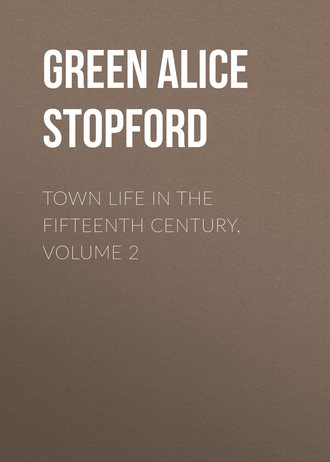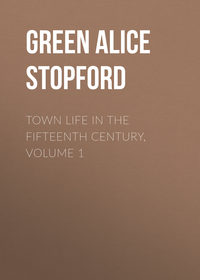 полная версия
полная версияTown Life in the Fifteenth Century, Volume 2
836
Hist. MSS. Com. xi. 3, 196-202. There were “constabularies” which corresponded to wards, over which a captain was appointed in time of war or danger. (Hist. MSS. Com. xi. 3, 167.)
837
Beloe, Our Borough, 16.
838
Hist. MSS. Com. xi. 3, 191-4.
839
Beloe, 17, 18. Gross, ii. 170.
840
Ibid.
841
Hist. MSS. Com. xi. 3, 195, 203.
842
Instances of the important place held by the alderman in matters of town government in 1420. (Ibid. 246, and in 1431-42, p. 162-4.)
843
In 1426 the alderman of the guild chose four fit persons who took the accustomed oath and entered the chamber; they chose four others, who, after being sworn, were brought into the chamber, and the eight then added to their number four more. The whole body of twelve, after sitting from the tenth to the third hour, were finally divided as to the election of the serjeant who had in some way offended the community, and at whose name a “great murmur now arose amongst the people” waiting outside. He was, however, chosen after asking pardon of the mayor and community for his offence. (Ibid. 160.) In 1477 another election is described, which was carried on in exactly the same way. (Ibid. 169.) And in 1470, when a constable had to be elected there was the same procedure.
844
Beloe, 21.
845
Hist. MSS. Com. xi. 3, 245, 246.
846
The gradual change in the mode of electing burgesses for parliament illustrates the action of the councils in absorbing influence. In 1314 the jury to elect the burgesses had been chosen by a committee of twenty-six townsmen. But at least from 1425 the mayor assumed the right of choosing the first four of the jury, who then named the remaining eight. In 1433, if not earlier, the mayor was bound to select two of the twenty-four and two of the twenty-seven, and the added eight members were all taken from the same bodies; and in 1442 this custom was made into a permanent law. (Hist. MSS. Com. xi. 3. 240, 157-8, 163-4, 166-9.) About 1523 the burgesses were chosen by the twenty-four and twenty-seven voting personally in assembly; this assembly, called the “House,” carried on all dealings with members, instructed them, paid them, and received their reports. The first effort of the burgesses at large to take any part in election was at the Long Parliament. (Ibid. pp. 148-9.)
847
1427, Ibid. 160; 1428, p. 161; 1441, p. 163-4; 1442, p. 164; 1466, p. 168. Cf. also p. 148.
848
Hist. MSS. Com. xi. 3, 162.
849
Ibid. 246.
850
Ibid. 170.
851
Hist. MSS. Com. xi. 3, 163.
852
Ibid. 158-9, 161.
853
Ibid. 167.
854
Ibid. 168. The use of the word communitas in 1463 is here explained as showing how the term had “already lost its original meaning and was used to designate the humblest and least influential class of the burgesses.” But community was used in exactly this sense in 1305. (Ibid. 187.)
855
For some details of the seventy-five guilds of Lynn see the Norfolk Antiquarian Miscellany, edited by Walter Rye, Part I., pp. 153-183.
856
Lyon’s Dover, I. xi.; ii. 267-8, 287, 312, 370.
857
In Dover the common assembly summoned in the same way was called a Hornblowing. (Boy’s Sandwich, 797.)
858
Ibid. 538.
859
Ibid. 783-4. In 1565 291 households were English and 129 Walloons. But there were many foreigners in Sandwich at a far earlier time.
860
In 1466 and 1492. Boys’ Sandwich, 675, 679.
861
Ibid. 787.
862
Ibid. 673-6. In 1469 the commons of Sandwich at a Shepway court desire that the mayor may be kept in safe custody for such charges as they will allege against him. (Ibid. 676.)
863
Boys’ Sandwich, 677.
864
Lyon’s Dover, i. 206-7.
865
Boys’ Sandwich, 683.
866
At the same time the jurats, who as late as 1492 need only have lived a year in the town, “he and his wife together,” must now have been there at least three years. (Ibid. 679-701.) Jurats were ultimately chosen or nominated by the mayor in Dover and in Winchelsea. (Lyon, ii. 268, 371.)
867
Boys, 686.
868
Skelton’s Poems. Ed. Dyce, 381-2.
869
Green’s History of the English People, i. 211-225.
870
See p. 238. Mr. Maitland’s Archaic Communities (Law Quarterly), 47.
871
Brinklow’s Papers (Early Eng. Text Soc.) illustrate the uncompromising ideas of radical reform fostered in towns.
872
Bishop Creighton’s Wolsey, 51, 59.
873
Skelton’s Poems. Ed. Dyce, i. 386.
874
See Vol. I. Ch. VII.
875
“He rules his commonalty
With all benignity,
His noble baronage
He putteth them in courage
To exploit deeds of arms…
Wherever he rides or goes
His subjects he doth support,
Maintain them with comfort
Of his most princely port.”
Skelton, ii. 81-2.
876
Vol. I. p. 26, n. 5.
877
“And then they (princes) daub over their oppression with a submissive, flattering carriage, that they may so far insinuate into the affections of the vulgar, as they may not tumult nor rebel, but patiently crouch to burdens and exactions.” (Erasmus, Praise of Folly, tr.), 151.




